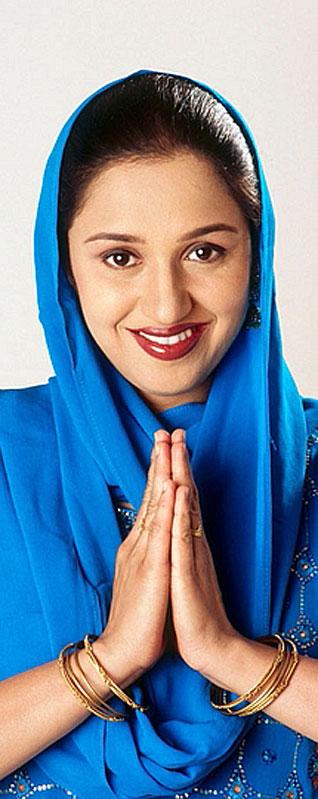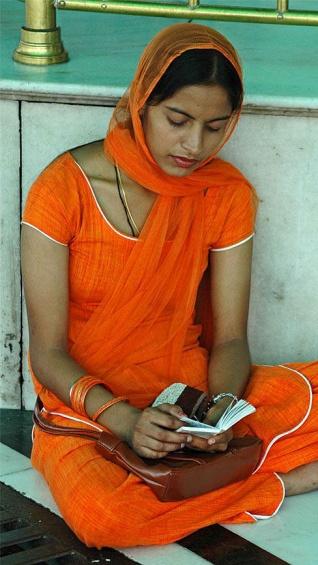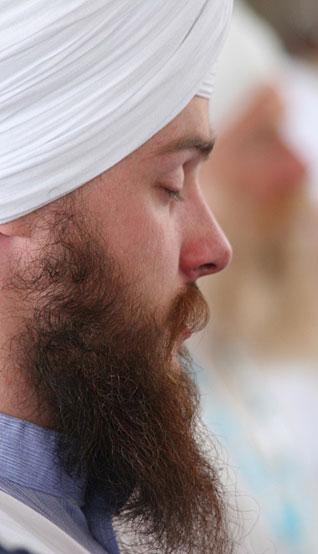
Photo above: courtesy - Dinodia. First from bottom: courtesy - Gurumustuk Singh. Second from bottom: courtesy - Shunya.



People
Hersh Auntie
by PUNEET PARHAR
Hersh Auntie is telling us a parable about our relationship with God.
"To entice your beloved, you must disengage yourself from all those distracting things; Porsches, diamonds, big houses, dollar bills", she says. "How can you entice your beloved if you are bogged down with material things?"
With no gurdwara, or Sikh temple, here in Kingston (Ontario, Canada), Hersh Auntie's home in the suburbs serves as a house of worship for the Sikh students at Queen's University who come here every week to listen, learn and pray.
After the paath, we gather around the table for a meal of rice, roti, and curried chickpeas. The conversation is in English, and all kinds of questions are raised: "What does Sikhism say about gay marriages?" "How do we feel about inter-religious marriage?" "What about the caste system?"
Hersh Auntie suggests answers, but she stresses the importance of doing your research for yourself. "You must learn for yourselves", she tells us. "Do not let anyone fool you with their interpretations of the Gurus' teachings".
Back in my hometown of Mississauga, the Dixie Road Gurdwara sits alone amidst the Ontario fields, gleaming like a gem, its imposing golden roof strung with Christmas lights lit up all year round. In the background stand a gas station and the headquarters of a trucking company, and behind them, suburban homes.
In the foyer of the gurdwara, row upon row of shoes - sparkly heels, pumps, Pumas and snowboots - crowd the hallway. Further inside is the langar area, where barefooted Sikhs from all over Ontario congregate and chat in Punjabi, share a meal sitting next to one another on the floor, and swap business contacts, gossip, and information about India and relatives back home as well as in other parts of the diaspora, all the while keeping their heads covered.
Sundays here mean we have to cover our heads with dupattas to avoid the babas - the caretakers - who are constantly on the prowl, ready to pounce on any young person whose head scarf doesn't hold up throughout the paath service.
Sundays also mean yanking from the back of our minds those sacred pearls, the Punjabi words which have become dusty during the schoolweek. One must be able to understand Punjabi to understand paath, to speak to our elders, and to communicate with our community.
Stepping into the gurdwara space is like stepping across a threshold which divides Sikh culture from the world outside. It functions much like a mini-homeland for Sikh immigrants.
"The gurdwara is being used as a community centre, a place for the older generation to conducts its social affairs", says San Grewal, a writer of Sikh descent at the Toronto Star. Except for the odd whispers of kids asking their parents for donation money, wanting an extra roti but too shy to request it in Punjabi themselves, or wondering when they're going home, little or no English is spoken here.
Says one Sikh father: "Parents take their kids to the gurdwara to be closer to the culture, to give them a flavour of the culture not available to them anywhere else".
My friend Sunny sits alone in silence in the gurdwara - that is, when he attends, which is rarely.
"I go once every couple of months or so, usually on my own", Sunny says. "Usually because it's a special event, New Year's or something like that. If I go on my own, I'm only there for like ten minutes". I sometimes wonder what Sunny's visits to the gurdwara must feel like. Most men who forego wearing the turban abide by the protocol with the help of a kerchief tied bandanna-style round their heads.
But Sunny, a fourth-year business major at Ryerson University, wears a ponytail. Not the kind he can tie up in a turban like his father or grandfather at home in Mississauga, both of whom are fully-practicing Sikhs who have kept their kesh.
Sunny wears his hair more like Johnny Depp or Antonio Banderas. An oddity in the gurdwara. Works at Holt Renfrew - it shows in his "high style" - and parties hard on weekends.
Sunny is silent in the gurdwara because he does not speak Punjabi. "I mean, there are many times I feel the urge to go", he says, "but it's like when I'm there, I can't really talk to anybody or converse with anyone. And I barely understand what's going on".
"It is the silence that isolates", explains Dr. I.J. Singh, a prominent writer on Sikh identity issues currently facing Sikh youth in the diaspora. He points out how silence defines the relationship between our parents' generation and the younger generation.
But he says this is not the Sikh way. "The Gurus taught by dialogue and discussion", he says. "It was a horizontal dialogue. In a horizontal dialogue, each side listens to the other; an answer is not thrust down the throat of the seeker, but the questioning mind derives the answer that satisfies it. This is the Sikh way".
For Rup Kaur Dhaliwal, a lawyer and founding member of Queen's Sikh Students Association, Sikhism is like a forward-moving path. "Every Sikh is at a different point on the spectrum", she says. One moves forward by asking questions and gaining new knowledge, which can only happen through a reciprocal dialogue with those in the know.
Dhaliwal, who was raised in Calgary, explains how she has successfully managed to overcome the obstacles that block many youth from constructing an ongoing relationship with Sikhism.
"My parents never forced us to do paath", she says. "But I had a lot of friends who did paath hardcore and who were heavily involved in the gurdwara - that's how I got involved. It used to take me an hour and a half and I used to get frustrated, but you need to make it a personal mission and goal and embrace Sikhism yourself. Now it only takes me ten to fifteen minutes".
She recognizes that kids like herself, who will take such an endeavour upon themselves, are few and far between. "Many of our youth need mentors [and] that's why I got involved. We try to get kids who don't speak Punjabi, who don't do paath, who don't normally go to the gurdwara".
A lack of horizontal dialogue is not the only thing that comes between young Sikhs and their traditional culture.
Take Manu.
When we met in high school, Manu was the only kid at Clarkson Secondary who kept his hair long and guarded in a turban. He let it out once in the cafe and all the girls crowded around to touch it. We used to have discussions about Sikh principles in algebra class.
One day, in grade 11, Manu slouched into school with a shaved head and a (fake) diamond-studded Playboy bunny around his neck. He was tired of being different, of being marked as an outsider because of his hair. It wasn't that Manu needed help in connecting to his religion. He speaks Punjabi fluently - he used to tease me in Punjabi in class. When I ask Manu about paath, he tells me: "I don't even go anymore, what's the point with all that bullshit on the walls".
When Manu used to go to the gurdwara, he would see the fresh young faces of boys like himself - young guys who have kept their kesh - plastered all over the walls. Their pictures are hung with care near those of the Gurus, captioned neatly by statements written in Punjabi lettering which, roughly translated, read that these men have died in this or that conflict with Indian police and have performed their duties for the Sikh religion.
I googled some of their names and learnt that most of them belong to an organization that has been outlawed and labeled terrorist by the Canadian government. Their faces are plastered all over the media, especially with the recent frenzy around the Air India bombing trials. And they look just like Manu: none of these males are older than thirty years of age and all of them were raised in either Canada, the U.S., the U.K., or Australia.
Young men like Manu face enough with the pressure to date and be attractive to girls who prefer the mainstream ideal. Add to this the fearsome image that is projected onto them in the media and their daily lives, and the pressure to sever their ties to their religion - along with their long hair - seems insurmountable.
Manu has already turned away from his religion. And Sunny is in danger of losing his bond with Sikhism if something doesn't happen soon to connect him with his faith. Rup points out that "the next generation of Sikhs are not picking up the religion. It's like a filter, the next generation knows less and less. If we, who at the least still have our parents, don't learn and promote the Sikh religion here in Canada, how are our kids going to know anything?"
And yet, back in the room with Hersh Auntie, as we listen to her tell us that "as Sikhs we must look for the same pure vibration in others that exists in all of us", it becomes clear to me at least that there is something about our religion that transcends culture and circumstance, that is worth hanging onto at all costs.
On the drive back to Queen's, Dill, one of the young men in the room with Hersh Auntie, tells me: "Back home in Brampton, I went occasionally to the gurdwara with my parents; didn't understand anything, the only thing I knew was that listening to paath made me feel calm. It wasn't until I came to Queen's that I learnt anything about my religion. It's visiting Hersh Auntie that keeps me sane in this university".
Conversation about this article
1: Desh Singh, MD (Houston, U.S.A.), February 19, 2008, 8:05 PM.
This is an important article and I hope we all pay attention to it. America and Canada are not "melting pots" and they have never been. They are cultural battlegrounds. Young Sikhs who are lost in these battlegrounds to externally imposed inferiority complexes that encourage them to ape vapid cultural elements are not to be blamed for their decisions. They are ill-prepared and uneducated about the Sikh way of life. How can one be proud of what one doesn't know? In our parents' haste to establish themselves materially and socially in the west, they often did not have the time or energy to inculcate the Sikh ethos into their children. However, as time passes and Sikhs set deeper roots in the west and intergenerational wealth transfer occurs, the North American Sikh presence will grow increasingly stronger. Already in the generation behind me, I see stronger, more disciplined and more numerous committed Sikhs than the ones in my own. We have done a good job in cultivating a new generation of leaders. Highly accomplished Sikh youth leaders steeped in Gurbani and Gurmat are legion. Sikh camps, conferences and youth events throughout North America are swelling with participants. There are many young committed U.S. Sikhs aspiring to join their Canadian brethren by becoming elected public officials in their homelands. However, there are also many young Sikhs who have become disenfranchised from Sikhism. These are losses we cannot afford. What can be done? Education, engagement and outreach are the ultimate answers. We should accumulate and pool vast material resources that will enable us to build large organizations and enterprises that can engage, develop and harness the energy of our young people. We need Sikh-owned movie production studios, artist colonies, human development organizations that fund Third World missions, public relations firms, community health organizations, investment firms, lobbyists, online publications, and Gurdwaras in high-profile urban locations such as Manhattan, London and San Francisco. If our young people are provided with opportunities they cannot find elsewhere to grow, develop and thrive in the 21st century, they will have the security, time, desire and sangat to develop into strong Sikhs. If our way is truthful and one that deserves to thrive in this new millennium, it will be reflected in our vision and what we build for those who come after us. Remember that the great Sant Attar Singh, who spent many years meditating in a cave to reach a very high spiritual state, upon emerging built many schools and Sikh institutions. If we build it, they will come.
2: Chintan Singh (San Jose, CA, U.S.A.), February 20, 2008, 3:25 PM.
An excellent and timely article. There are several Hersh Aunties all over North America who are doing their bit in conveying the true message of Sikhism to the youth in their local areas, but there needs to be an umbrella "Hersh Auntie" or a larger united effort to make a big difference that is visible all across our far flung community. In that sense, I agree with Desh Singh's comment on having mega institutions that will provide a support structure to youth in spiritual as well as professional terms but, at the same time, I feel we should not keep our youth confined to our own created infrastructures and institutions. Rather, they need to be made strong enough to keep their identity while easily fitting into external environments and cultures. The true definition of diversity is that all cultures co-exist but don't loose their identity to another.
3: Bhupinder Singh Ghai (New Delhi, India), February 21, 2008, 5:46 AM.
There is great need for mentors who are ready to listen to youth and counsel them. We need granthis who are well wersed in English. We need to have services in English; if that sounds far fetched, at least explanations of the shabads during kirtan and hukamnamas will go a long way. We need to give specific seva duties also to youth so that they feel involved. Also, I would like to add some examples to Desh Singh ji's suggestions. Organizations like the Red Cross, YMCAs, the Salvation Army, Missionaries of Charity, etc. As he rightly pointed out, Sikhs need to be at the right places in the right light and what we need to do is to creat a value with brand "SIKH". Sikhs should be proud of who they are. I think we do not need any more massive gurdwara buildings. A large number of Sikhs will support these, but the question is: who will run these institutions? I personally would not trust the SGPC and I don't have an answer whom we should. Till the time we have these, again I would suggest we use Cyber Khalsa concept where at least like minds come together.
4: Savraj Singh (Pennington, New Jersey, U.S.A.), February 22, 2008, 2:26 AM.
This is absolutely the most profound issue facing us today as a panth. One great activity that Gurudwaras can organize are "Youth Seminars" during the regular Sunday program. Have speakers say a few words in English about Sikh ideals and pick a different topic each month. This has been done with great success in the Philadelphia and Lawrenceville, NJ gurdwaras, and others too. The Philly Gurdwara is holding it's sixteenth such seminar on March 2 on the topic of Langar. Four speakers were chosen from the sangat, and each seminar opens everyone's eyes to the beauty of their own religion. Let's face it - most people show up for the food and go home. I.J. Singh is right, we absolutely need more dialogue and interaction. We need only look across the street to the synagogue or church to see effective strategies that provide enough 'activation energy' for kids to embrace a faith and make it their own. Go to any church and you'll find an active youth group with a full-time mentor that has gone to seminary to learn how to make it his or her life purpose to serve the youth. We need more people like this in Sikhi!
5: Satvir Kaur (Boston, U.S.A.), February 22, 2008, 9:22 AM.
I like what Hersh Auntie is doing! Good job!
6: Jay Kalsi (London, England), February 24, 2008, 4:35 PM.
I was born a Sikh but I don't think I can call myself a Sikh anymore because I don't speak Punjabi correctly and whenever I would go to the Gurdwara, people would get angry or laugh at me when I made mistakes. I figured that if people wouldn't at least be friendly to me, I don't have a place amongst them. I've found spiritual friendship by belonging to a Buddhist group comprised of people of all races and backgrounds, where nobody judges you just because I don't speak Punjabi the right way, or because I don't wear a turban or whatever. I don't think Gurdwaras are very welcoming places if you don't conform to the elder people's perceptions. I know that there are a lot of people who feel the same way, i.e., British Sikhs born in England who don't get treated well or kindly inside Gurdwaras and feel distanced and like outcasts because of the arrogance of the elders.
7: Jay Kalsi (London, England), February 24, 2008, 4:54 PM.
I would like to just add something else if I may in answer to Desh Singh's statement when he says "Young Sikhs who are lost in these battlegrounds to externally imposed inferiority complexes that encourage them to ape vapid cultural elements are not to be blamed for their decisions." I object to Desh Singh's characterisation of non Sikh culture being comprised of 'vapid cultural elements'. It suggests a degree of bigotry and ignorance about the societies in which we live. Many Sikhs find aspects of Sikh culture to be vapid and offensive, things like arranged marriages, the continuation of the caste system, the relegation of girls to secondary status amongst Sikh communities, the general closed minded attitudes and intolerance of difference that you find there. How much more vapid could you get than these things? When Sikhs leave behind the Sikh community, it's because they want to escape from these claustrophobic narrow minded aspects of Punjabi culture that strangle the mind and soul. They discard vapid and backward cultural bigotries for things like freedom of the individual, freedom of conscience, freedom of choice of marriage, and discard the racist attitudes many older generation Sikhs have towards white people. Western societies are not 'vapid'. The best of Western society is one of freedom and respect for the individual and equality of all boys and girls and men and women where you are free to choose your own life partner without fear of being disowned, persecuted or intimidated. These are the things that are missing within the confines of large parts of the Sikh community living in Britain, America and Canada. Unless you face up to this, you aren't going to be able to stop people leaving the Sikh community because you don't even understand why they want freedom from all these cultural complexes and backwardness that secular society offers them liberation from.
8: Bhupinder Singh Ghai (New Delhi, India), February 25, 2008, 7:48 AM.
The Sikh religion is one of the most modern and forward thinking religions. The comments posted by Mr. Kalsi highlight the classic case of ignorance of these values. It's actualy not his fault ... they are values that need to be inculcated from childhood, and over a lifetime. They cannot be spoon-fed or absorbed one fine day when you are an adult. You need to be a seeker, and the spirit of the seeker has to be implanted in childhood. About western values, what values is he talking about? Drugs, alocholism, live-ins, teen pregnacies, teen violence, racism, xenophobia? Every culture has some positives and some negatives. We should strive to take the positives of all cultures. Finally, while there are indeeda number of Sikhs straying from the path, there are corresponding thousands who are touched by its essence. Indeed, each one of us deserves a Hersh Auntie.
9: Jay Kalsi (London, England), February 25, 2008, 7:35 PM.
Bhupinder Singh ji, if you read my posts properly, you would realize that none of those so-called 'western values' you quote as being representative of the West are what I was referring to. All of the bad things that Bhupinder quotes selectively are also present within Punjabi society both in India and in the Western Punjabi diaspora, except to that list of racism, drugs, alcoholism, you can also add caste-preoccupations, as well as a complete denial of the problems like domestic violence, gender selective abortion leading to a demographic imbalance between the sexes, and honour-based violence and killings. If the Sikh community in the West cannot reconcile itself to dealing with these issues, then it is going to struggle to keep future generations in its fold. Unless you understand this, and show sympathy for those who are repelled by these aspects of our culture, and hate and fight against practices like the caste system, honour violence, religious extremism, co-ercive arranged marriages, you will never be able to preserve Sikhism in the West in anything but the most hollow and empty tribal way. A religion should be a source of solace and spiritual nourishment. When it becomes a repository for excluding, sneering at and marginalizing those it claims to speak for, it must not blame other things like 'vapid western society' when those people respond by moving away from the reactionary social values upheld by some members of the community.
10: Kanwar (Canada), March 04, 2008, 2:02 AM.
Our Gurdwaras are turning away from the spritual aspect, they are more into rituals and politics. We need to concentrate on the more practical side of Sikhism (see all humanity as one, seva, compassion, love). This will give our kids a positive self-image. It takes courage to be different. One has to be fearless and have leadership qualities. All these are gained through simran (meditation) and positive self-image. That's what our gurdwaras have to provide to our youngsters.
11: Tejinder Singh (Kingston, Ontario, Canada), October 01, 2016, 9:55 PM.
With the grace of Waheguru, Kingston (Ontario, Canada) has a formal gurdwara located at 50 Hickson Avenue, south of Highway 401, west of Montreal Street. Your Hersh Auntie is very actively associated with the gurdwara. At present the daily service starts at 8.30 am with parkash and nitnem that last until 9.30 am and end with Rehras Sahib and Sukh Aasan from 6.00 pm to 7.00 pm. The gurdwara is locked in between these times. On Sundays Queens University students recite Sukhmani Sahib and do kirtan after Japji Sahib. The Guru's sangat is sincerely invited to come and visit the new gurdwara and drop in on Hersh Auntie.
12: Ash Singh (Singapore), October 01, 2016, 10:30 PM.
Love you Hersh mama. So proud of you.


